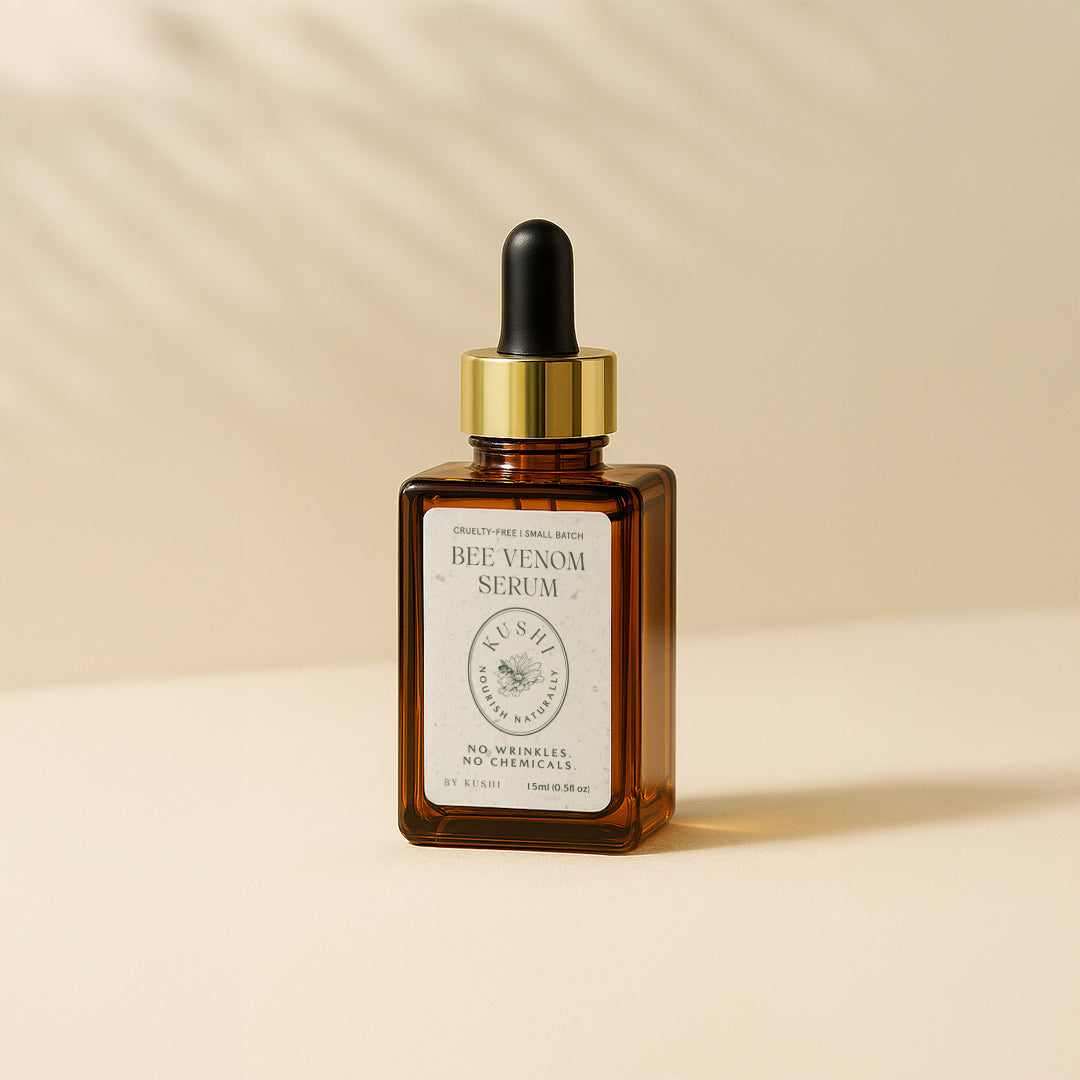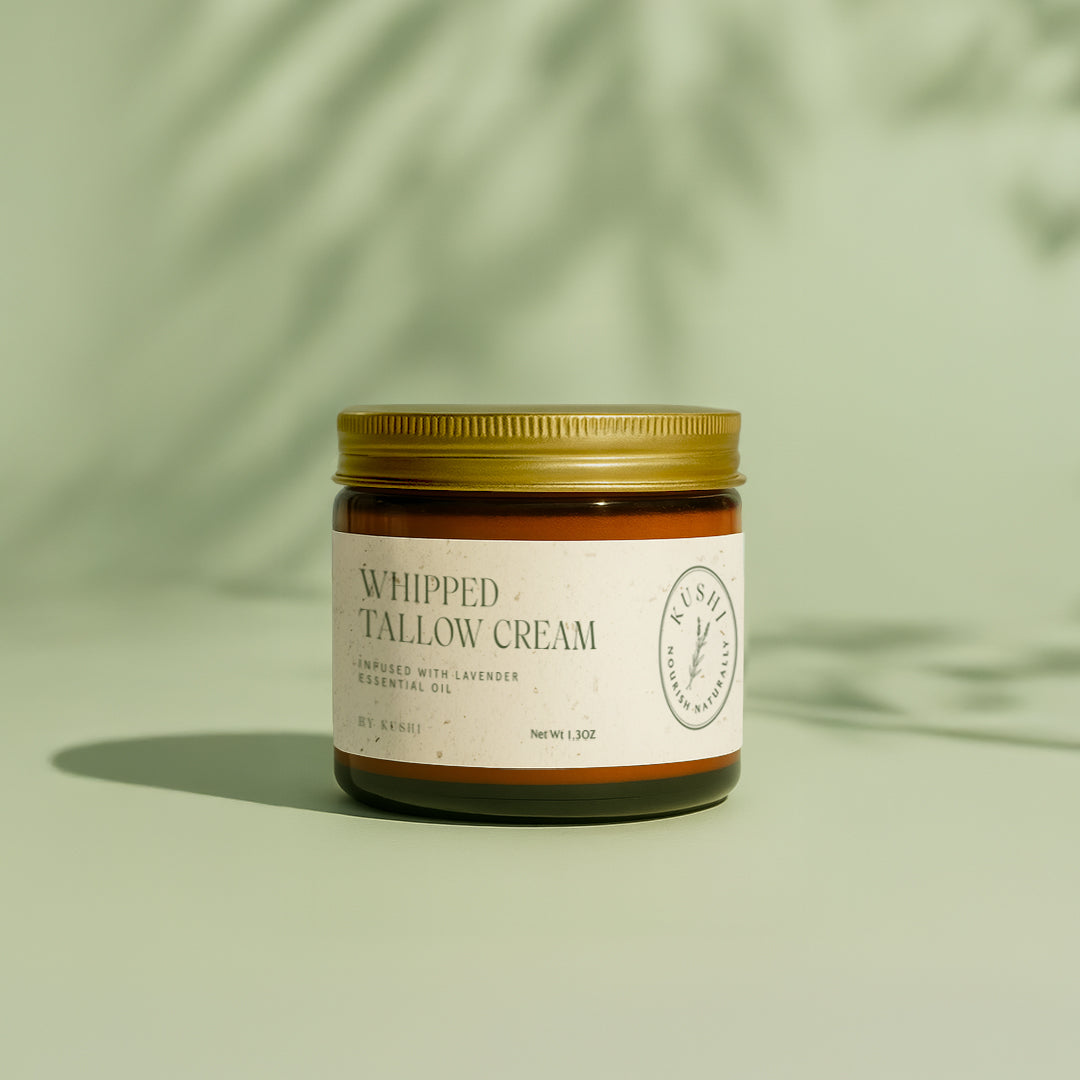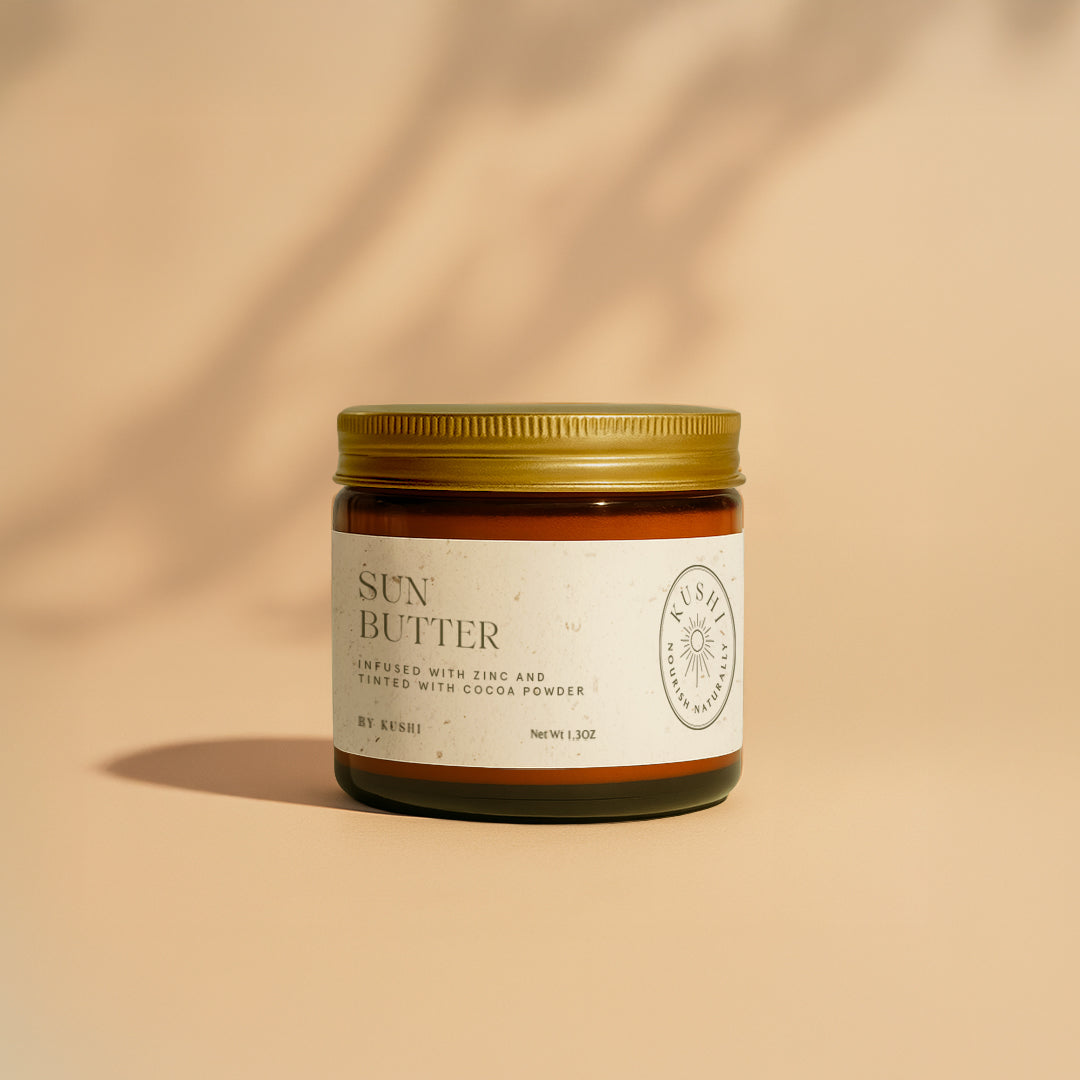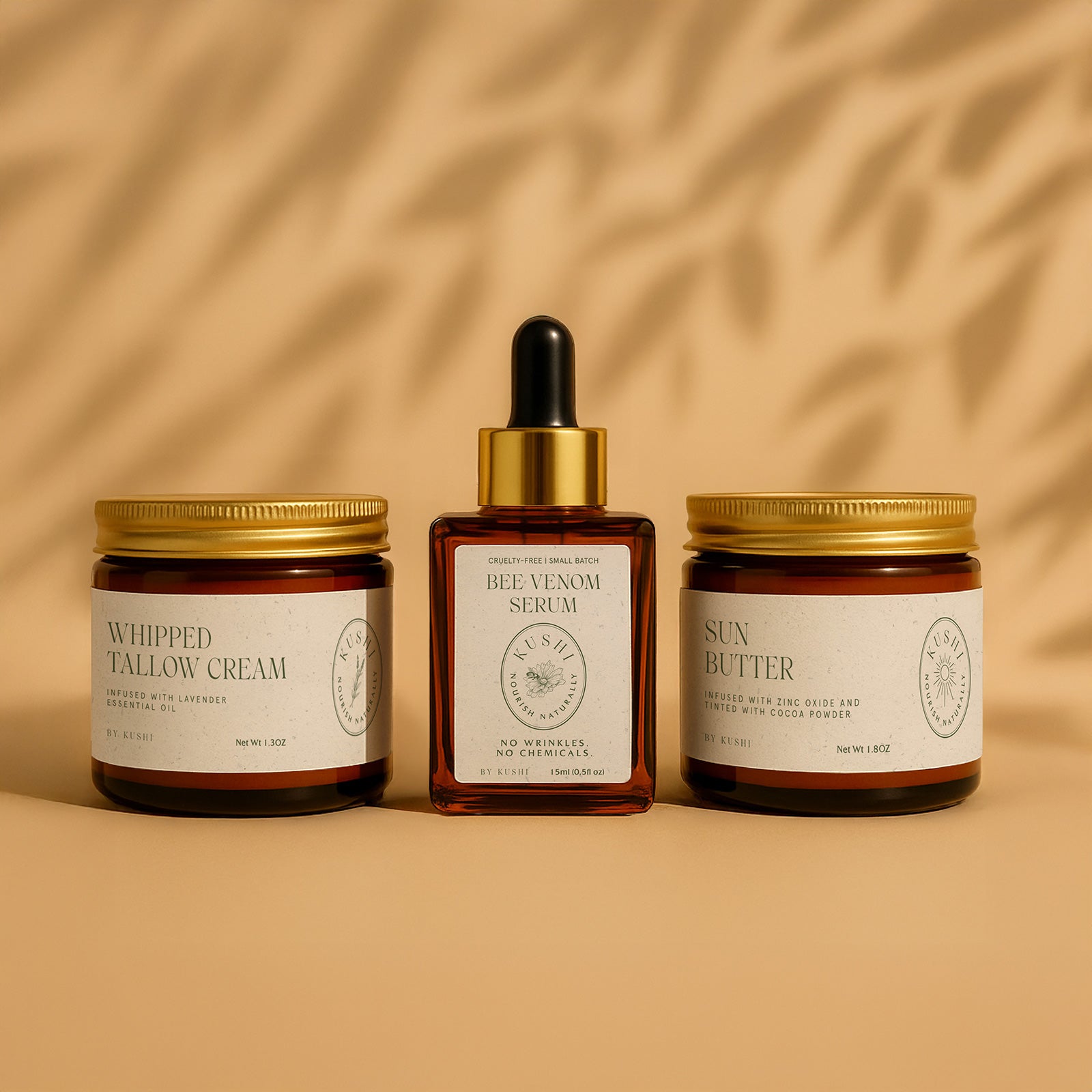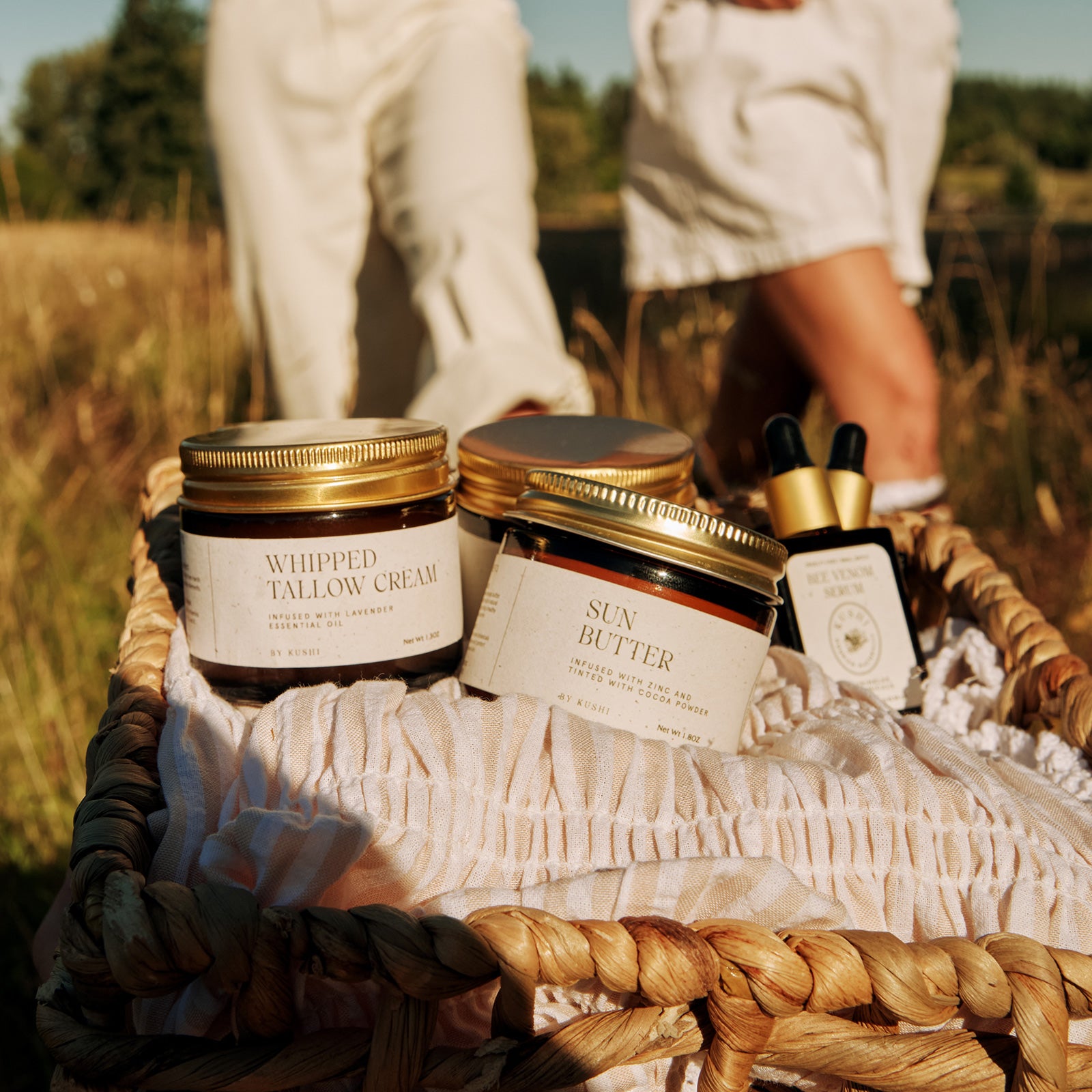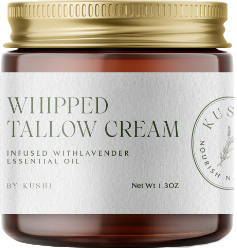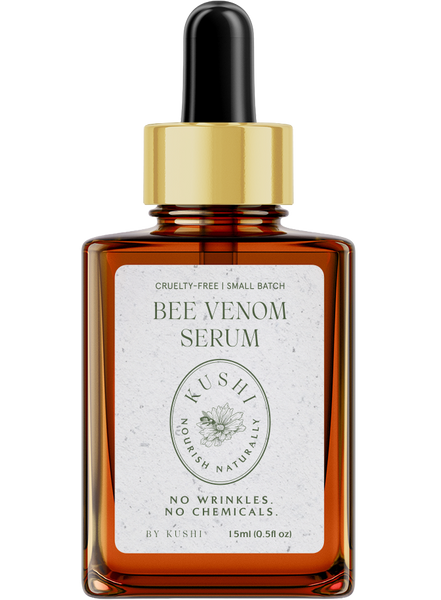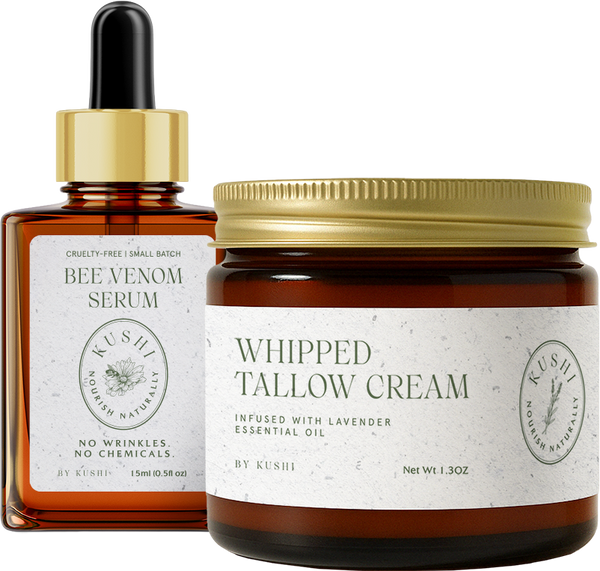Key Takeaways:
-
Understanding Triggers: Identifying personal flare-up triggers helps guide smarter lifestyle and skincare choices.
-
Barrier Repair Focus: Restoring and protecting the skin barrier is key to reducing redness and discomfort over time.
-
Minimalist Skincare Wins: Using fewer and high-quality products like tallow-based moisturizers can lead to calmer, more resilient skin.
Rosacea is more than just occasional flushing, it’s a complex skin condition with layers of sensitivity, inflammation, and discomfort. Managing it often feels like guesswork, especially with how unpredictable flare-ups can be. For many, conventional skincare only adds to the irritation. That’s why a more intentional approach is needed, one that respects the skin’s needs, simplifies your routine, and focuses on long-term support rather than quick fixes. When you understand what your skin is asking for, you can begin to give it the care it actually needs.
At Kushi, we don’t follow skincare trends, we set a higher standard. Our approach is grounded in ancestral skincare traditions, backed by real nourishment from ingredients the body recognizes. With a deep respect for the skin’s natural rhythm, we’ve helped thousands find calm, clarity, and comfort through minimal, whole-ingredient formulas that support barrier health without compromise. Our Whipped Tallow Cream has become a trusted staple for sensitive, reactive, and rosacea-prone skin, not because it’s trendy, but because it works.
In this piece, we’ll be discussing natural, effective rosacea self-care tips, how to avoid common triggers, and how Kushi’s Whipped Tallow Cream can support calmer, more resilient skin.
Understanding Rosacea And Its Triggers
Rosacea is more than occasional redness, it's a chronic skin condition that often shows up as persistent flushing, visible blood vessels, sensitivity, and in some cases, bumps or thickened skin. While the exact cause remains unclear, experts agree that inflammation, genetics, and environmental stressors all play a role.
For many, symptoms are triggered by everyday factors like spicy foods, alcohol, sun exposure, hot beverages, extreme temperatures, and even stress. Unfortunately, harsh skincare products can make matters worse, disrupting the skin’s barrier and intensifying irritation.
Recognizing your personal triggers is the first step toward effective self-care. A skin journal can help, track what you eat, your skincare routine, and any flare-ups. Over time, you’ll start to notice patterns that point to what your skin is reacting to.
Rosacea can’t be cured, but it can absolutely be managed. The goal is to calm inflammation, protect the skin barrier, and simplify your routine with products that support, not stress, your skin.
Gentle Skincare: The Foundation Of Rosacea Self-Care
When your skin is reactive, less is often more. Rosacea-prone skin thrives on consistency and simplicity. A gentle routine built around soothing, non-irritating ingredients can help reduce flare-ups and rebuild the skin’s natural barrier over time.
Start with a fragrance-free, creamy cleanser that doesn’t strip your skin. Avoid foaming or exfoliating cleansers, which can aggravate redness and leave your skin feeling tight or raw. Cleansing should leave your skin soft, not squeaky.
After cleansing, skip the toner if it contains alcohol or astringents. Instead, reach for products that replenish moisture and calm the skin. This is where texture and formulation really matter. Lightweight lotions may evaporate too quickly or contain fillers that irritate compromised skin.
A rich, nutrient-dense moisturizer can create a protective layer that locks in hydration and shields against environmental stressors. Choose formulas with minimal, recognizable ingredients and no synthetic fragrance. That’s the type of skincare rosacea responds to best.
The Power Of Natural Moisture: Why Tallow Works
Tallow is one of the most skin-compatible moisturizers available, especially for those with reactive, rosacea-prone skin. Unlike synthetic creams or water-based lotions, tallow shares a similar structure to the skin’s natural oils, making it incredibly nourishing without being irritating.
What makes tallow unique is its rich profile of vitamins A, D, E, and K, all of which support skin repair and barrier strength. These nutrients occur naturally in grass-fed tallow, without the need for chemical additives or preservatives. That means you're feeding your skin exactly what it needs, without introducing unnecessary irritants.
For those struggling with dryness, flaking, or persistent redness, tallow provides deep moisture that doesn’t clog pores. It soothes inflammation, encourages healing, and helps restore a feeling of balance, which is exactly what sensitive skin is often missing.
If you’ve tried countless moisturizers and nothing seems to work, the answer might not be in more ingredients, but in fewer, better ones.
Simple Lifestyle Adjustments That Make A Difference
Rosacea isn’t just a skin issue, it’s often influenced by what’s happening in your environment and your body. While a solid skincare routine is essential, your daily habits can have just as much impact. Here are a few lifestyle shifts that can help reduce redness and sensitivity over time:
Protecting Your Skin From The Sun
UV rays are one of the most common and potent rosacea triggers. Even minimal exposure without protection can cause a flare-up, so daily sun care is a must, not just on sunny days. Mineral-based sunscreens with zinc oxide or titanium dioxide tend to be the gentlest and most effective option for sensitive skin.
Being Mindful Of Heat And Diet
Heat, whether from showers, hot drinks, or spicy food, can dilate blood vessels and cause facial flushing. Opting for lukewarm water and avoiding common food triggers like alcohol, caffeine, and overly spicy dishes can make a noticeable difference. Keeping a personal trigger list helps identify what your skin reacts to most.
Reducing Stress For Calmer Skin
Chronic stress impacts your nervous system, immune function, and, yes, your skin. Flare-ups often appear during high-stress periods, which is why relaxation practices can be a helpful part of rosacea management. Daily moments of calm, whether through movement, journaling, or a quiet walk, can help regulate your skin’s response over time.
How Kushi’s Whipped Tallow Cream Supports Sensitive Skin
Moisturizing is one of the most important steps in rosacea self-care, but not all moisturizers are created with sensitive skin in mind. Kushi’s Whipped Tallow Cream is designed to nourish without irritation, using ingredients that work with your skin, not against it. Here's how it supports a calmer, more resilient complexion:
Formulated With Skin-Identical Nutrients
Tallow naturally contains vitamins A, D, E, and K, nutrients that support skin repair, balance oil production, and calm inflammation. These aren’t added in artificially; they’re present in the whole, grass-fed ingredient itself. Because the structure of tallow closely mimics human sebum, it absorbs easily and delivers benefits deeper into the skin.
Whipped For Lightweight, Non-Greasy Hydration
A common issue with rich moisturizers is that they feel heavy or leave behind a greasy residue. Kushi’s cream is whipped into a soft, airy texture that glides on smoothly and absorbs without clogging pores. It’s ideal for skin that needs moisture but reacts easily to dense or occlusive products.
Supports A Healthy Skin Barrier
Rosacea often goes hand-in-hand with a damaged skin barrier. The Whipped Tallow Cream helps rebuild that barrier by sealing in hydration and shielding skin from environmental triggers like wind, dryness, and pollution. Regular use can reduce flaking, tightness, and visible redness.
Made Without Harsh Additives Or Fragrance
Sensitive skin doesn’t need extra fragrance, fillers, or unnecessary actives, and this cream leaves them out entirely. Every ingredient is purposeful, clean, and gentle, making it a safe choice for reactive skin types. When your skin is overwhelmed, simplicity like this makes all the difference.
Other Natural Ingredients To Look For
While tallow is an excellent option for moisture and barrier repair, there are other natural ingredients that can complement a rosacea-friendly routine. Choosing skincare with gentle, plant-based actives can provide soothing benefits without overwhelming the skin. Look for these naturally calming ingredients when building your self-care regimen:
Chamomile
Chamomile is known for its anti-inflammatory and calming properties, making it a go-to for irritated or flushed skin. It contains compounds like apigenin and azulene, which help reduce visible redness and promote healing. Used consistently, chamomile can support a more even-toned, less reactive complexion.
Colloidal Oatmeal
This ingredient forms a protective film over the skin, helping to lock in moisture while soothing itchiness or discomfort. It's especially helpful during flare-ups, when skin feels hot or tight. Oatmeal’s calming beta-glucans also support the skin’s natural repair process.
Aloe Vera
Aloe vera has a cooling effect that’s especially helpful during active flare-ups or sun exposure. It hydrates without clogging pores and contains antioxidants that fight inflammation. When used in moderation, aloe can help take down surface heat and calm visible irritation.
Green Tea Extract
Green tea extract is rich in polyphenols, which are natural antioxidants that help reduce redness and protect the skin from environmental stress. It also has antimicrobial properties that may be beneficial for those dealing with rosacea-related bumps. A good choice for daytime use, especially when paired with SPF.
Final Thoughts
Rosacea doesn’t follow a rulebook. It can be triggered by the weather, your dinner, your emotions, or seemingly nothing at all. That unpredictability can be frustrating, but it doesn’t mean you’re powerless. With the right care and consistency, rosacea-prone skin can become stronger, calmer, and easier to manage.
The first step is knowledge: understanding what sets your skin off and what brings it back into balance. From there, it’s about simplifying your routine, not chasing after the latest trend or piling on more products, but choosing fewer, better ones. The focus shifts from covering up symptoms to addressing what your skin actually needs: calm, protection, and nourishment.
That’s exactly what we aim to deliver at Kushi. Our Whipped Tallow Cream was created for skin that feels overwhelmed by traditional skincare, skin that needs comfort more than complication. It’s rich, restorative, and free from synthetic ingredients that often trigger sensitivity. Whether you're dealing with daily redness or occasional flare-ups, it gives your skin the support it needs to recover and rebuild.
There’s no one-size-fits-all solution, but you don’t need a long list of products to see change. Sometimes, the most powerful thing you can do for your skin is simplify, and trust in ingredients that truly work in harmony with your body.
Read Also:
Frequently Asked Questions About Rosacea Self-Care Tips
Can rosacea go away on its own without treatment?
Rosacea is a chronic condition, which means it won’t go away on its own. While symptoms may come and go, long-term care and management are necessary to keep flare-ups under control.
Is rosacea caused by poor hygiene or dirty skin?
No. Rosacea is not caused by poor hygiene or unclean skin. In fact, over-cleansing or using harsh products can worsen symptoms by disrupting the skin barrier.
Can diet really affect rosacea symptoms?
Yes, many people with rosacea notice that certain foods can trigger flare-ups. Common culprits include spicy foods, alcohol, and hot beverages, but triggers vary from person to person.
Is rosacea contagious or caused by bacteria?
Rosacea is not contagious and is not spread by bacteria or viruses. However, some theories suggest that an overgrowth of natural skin mites or an imbalance in the microbiome may play a role.
Can I wear makeup if I have rosacea?
Yes, but it’s important to choose non-comedogenic, fragrance-free makeup that’s formulated for sensitive skin. Mineral-based foundations and green-tinted primers can help reduce visible redness.
Does exercise make rosacea worse?
Exercise itself is healthy, but overheating during physical activity can trigger flushing. To manage this, try shorter, moderate sessions and keep cool water or a fan nearby.
Is it safe to exfoliate if I have rosacea?
Gentle exfoliation may be okay for some, but many with rosacea find that exfoliants — especially physical scrubs or strong acids — make their skin worse. It’s best to avoid unless your skin tolerates it well.
Sources:
- Medgyesi, B., Dajnoki, Z., Béke, G., Gáspár, K., Szabó, I. L., Janka, E. A., Póliska, S., Hendrik, Z., Méhes, G., Törőcsik, D., Bíró, T., Kapitány, A., & Szegedi, A. (2020). Rosacea is characterized by a profoundly diminished skin barrier. Journal of Investigative Dermatology. Advance online publication. https://doi.org/10.1016/j.jid.2020.02.025
- Xiong, J., Chen, S., Wang, P., Chen, A., Zheng, Q., & Cai, T. (2023). Characterisation of the bacterial microbiome in patients with rosacea and healthy controls. European Journal of Dermatology, 33(6), 612‑617. https://doi.org/10.1684/ejd.2023.4619
- Fisher, A. J., Sobhan, P. K., Wang, Y., & Steinhoff, M. (2023). Rosacea pathogenesis and therapeutics: current treatments and a look at emerging targets. Frontiers in Medicine, 10. https://doi.org/10.3389/fmed.2023.1292722
- van Zuuren, E. J., Fedorowicz, Z., Carter, B., & Charlie, P. (2021). Rosacea: new concepts in classification and treatment. Journal of the European Academy of Dermatology and Venereology, 35(1), 24‑37. https://doi.org/10.1007/s40257-021-00595-7
